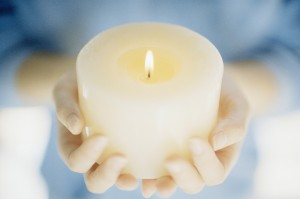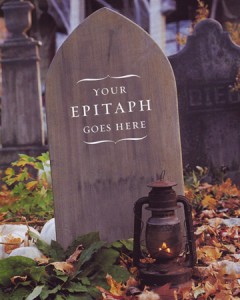Dying to the old self (December 5th)
December 05 – Dying to the old self: Find a time this morning and have the courage to visualize your own death … If you were to die this instant, what regrets would you have? What would you have done that you did not attempt? What would you have said that you did not say?
Sometime this afternoon, write your own eulogy. Keep it short and keep it potent. Mention what you stood for in Life and remember to mention your Gratitude for your Life in general. Conclude with the epitaph you’d like to be placed on your grave/memorial.
Finally, sometime this evening, take 30+ minutes and write an “Ethical Will”. This is not so much a distribution of your possessions (though you may include this if you wish) as it is an Honoring of your Life. Mention the major Blessings that graced your Life and your Gratitude for them. Mention the major pains that challenged you along the way and your Gratitude for them as well. Mention the ways that you served others selflessly. Leave your “Final Wisdom” – the one thing you would tell a loved one about “the Meaning of Life” (if you were only allowed to tell them one thing).
Bonus Activity: Write a short “Goodbye Note” to at least three (3) of your Life’s “major players” (e.g. parents, siblings, partners, teachers, friends, enemies).
As part of my “experiment with Truth” in 2004 (the experiment that ultimately led me to rediscover the psychological & sociological potency of “practical selflessness”), I engaged a variety of activities that seemed to show a complete disregard for my own mortality. Among other “dangerous activities”, I purposefully lived on the street for many months, I pilgrimaged purely “on faith” for eleven days (often without food or water in extremely inhospitable environments – from arid wastelands to impenetrable jungle plateaus), and I frequently sought to befriend sociopaths and aggressive meth-addicts. And because I had the courage (some say the lunacy) to do so, I was blessed both with a working understanding of the raw effectiveness of “radical Kindness”, as well as a deep appreciation for the pricelessness of human life.
And yet, another lesson I have learned from the last five+ years of my life is that the laws of interconnectivity (a.k.a. cause & effect or “instant karma”) seem to smile warmly upon every act that is kind, compassionate or otherwise selfless. My ego, along with the egos of others, would have me believe that I’ve just been “very lucky” to have survived at all, and yet explaining the effectiveness of the thousands of selfless choices I have made during the past 7+ years as mere “coincidence” or “luck” just doesn’t cut it. The Universe seems to “befriend” and “take care of” those beings who choose to act as selflessly caring “agents of Oneness”.
Because of this discovery, my appreciation for the pricelessness of my life’s moments had begun to wane. I realized that I have been taking my life for granted; that I have been assuming that as long as I continued to serve others selflessly, I would continue to live on and be cared for. And yet this is simply not how life functions. Many men & women far more courageously caring than I have been have long since perished – some of them at the very apex of their selfless lives. Like each of you, my clock is ticking down the moments until my death, and it is good to pause and take stock of where I have been, where I am, and where I intend to go from here.
Initially, it feels nice indeed to have no regrets. This feeling has come to me over the past few years after having come to understand a few things about regret: that regretting past actions not only wastes energy that could be positively invested in the present moment (the past cannot be changed, no matter how intensely we might pray otherwise), but it also resurrects the suffering of those past actions. And resurrecting those “mistakes” by regretting them only made it more likely that I would repeat them in the future. So I decided to consciously remove regret from my life. This does not mean that I do not recognize the errors of my past – I do. Past actions that caused others pain need to be recognized in order to prevent their repetition. This is healthy discernment, and I purposefully use this tool after every one of my actions.
Regret, on the other hand, is emotionally investing in past mistakes to the degree that we become self-critical. And this is the facet of past-pondering that I have removed. I recognize my errors, I apologize for them, I offer to make amends, and then I let go and move on to the next moment; a moment I intend to fill with actions that bring others joy.
A few years ago I also made a list of all the things I would have regretted not having done and all the things I would have regretted not having said were I to die that day. Both lists were surprisingly long, and I set about to make each of them smaller with every passing week – to the point where today these lists no longer exist. Yes, there are still things I’d like to do (set forth one day with only the clothes on my back – as a “pure” Peace Pilgrim), there are still places I’d like to see (India), there are still people with whom I’d love to speak (the Dalai Lama, Thich Nhat Hahn, Jimmy Carter, Oprah Winfrey, George W. Bush), and there are still a few apologies I’d love to personally relay (I have failed to relocate a few folks I harmed in my past). And yet, were I to die today, I would not regret these things. Rather, I would die with a smile on my face – not focusing on what could have been, but grateful for having been given the opportunity to Care for as many people as I have.
As far as writing my eulogy goes, I found it a very difficult thing to do, but not for the typical reasons. I have recently re-dedicated my life to honoring others, not seeking honor for myself. And this is what the traditional eulogy is; an honoring of the one who has passed – in this case, me. I don’t really want any praise at my funeral (if there even is one). And I certainly don’t want folks to mourn my passing. Everything I have to share with others centers around the Truth that it is our time while alive that matters, not the “afterlife” when our mind-bodies release our Souls back to The One*. And everything I have to share abut this Truth hinges upon releasing the desire to be cared for by others and replacing it with desiring to actively care for them.
*… or to Heaven, or to Hell, or back here in another fleshly form. It really makes no difference where we go after our mind-bodies cease to function. No one knows anything concrete about this “time of transition”. Indeed, the only certainty we have is that all of us are going to be surprised by what awaits us in the “hereafter”.
So I would have my eulogy center around the theme of practical selflessness; encouraging others to use my life as a two-fold guide – as a warning sign for the suffering that comes from self-centered choices (when remembering the selfish deeds of my first 35+/- years) and as a light of clarity that comes from choices that are Peace-fully performed for others (when remembering the deeds of “radical Kindness” I have extended, primarily in the years since the fall of 2005). If my eulogy can inspire others in this way, then and only then will it harmonize with the life I have chosen to live.
I also have faith that my memorial service (again, if there even is one) would be a joyful celebration of life; that those in attendance would replace their sadness with gratitude – the same gratitude I feel right now when I think of the millions of ways the people I have encountered in my life have blessed me. It does me no good to “miss them” when they are elsewhere. I cannot Love another when I am wishing for anything for myself (including their presence). I would rather be thankful that I knew them at all, and use their lives as inspirations for my own. This is how I would like the tone of my memorial to resound; that those in attendance would be inspired to go forth thereafter ands live lives filled with spontaneous acts of purposefully radical Caring (especially in those moments when they least wanted to do so).
It is this wish that is intimated in my desired epitaph:
To smoothly storm the Kingdom of Heaven,
choose be kind when least inclined.
And as far as my “Last Will & Testament” is concerned, I leave to Humanity the only thing I truly possess, which happens to be the only lesson worth remembering; that the “Meaning of Life” comes to those make the moments of their lives actively Meaning-full.
Hint: this requires replacing all self-centered desires with the sole desire to bring others Peace.
In conclusion, I am especially thankful for today’s challenge. It has been good for me to remember that I, like all of you, only have so many moments left – each one of them uniquely powerful (and therefore priceless), and that it would behoove me to use my remaining time wisely (i.e. to bring Joy to others).
The clock is ticking – so what are we going to DO with the time we have left?







 ;
;